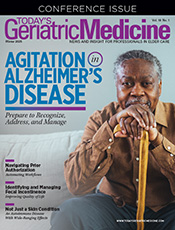
Winter 2025
Winter 2025 Issue Editor’s Note: New Year, New Beginnings Hello, everyone! I’m honored to formally introduce myself to you. My name is Chris Baldwin, and I am the new editor for Today’s Geriatric Medicine. In my professional career, I have worked with words in education, finance, and, most recently, health care, and I have been part of the Great Valley Publishing team for two years. I’m excited to step into this new role and help provide useful professional information and insights for those working in elder care. This issue examines often overlooked or ignored symptoms with potentially far-reaching consequences for patients and the health care team. In her feature “Agitation in Alzheimer’s,” Sue Coyle looks at agitation and how, if left unaddressed, it can negatively impact patients’ health as well as their caregivers. The added stress on caregivers as a result of the agitation can enact an emotional toll and lead to doubts about their own abilities. Mark D. Coggins discusses fecal incontinence, an oftenstigmatized condition that involves involuntary bowel leakage, and how it affects physical, emotional, and social well-being yet remains largely misunderstood. Increasing education for patients and providers is crucial to improving diagnosis, treatment, and quality of life for those living with this challenging condition. In addition, Jamie Santa Cruz reports on the connection between psoriasis and heart disease. This is due to proinflammatory cytokines such as tumor necrosis factor-alpha, interleukin-17, and interleukin-23 that are overproduced in psoriasis. The bloodstream carries these inflammatory chemicals, which impact not only the skin but also other bodily tissues, creating problems that are more than skin deep. Therefore, physicians need to be able to recognize and educate these ripple effects with their patients and their caregivers. Other articles examine the prior authorization insurance process regulating medical services and how its increasing application to routine procedures significantly burdens physicians and health care staff; COVID’s continued ripple effect on the health care team; and a unique way that some health care networks are trying to alleviate the stress burden for their professionals. I look forward to the future and helping provide knowledge and insights into the ever-evolving and complicated field of elder care. Enjoy the issue! — Chris Baldwin |
